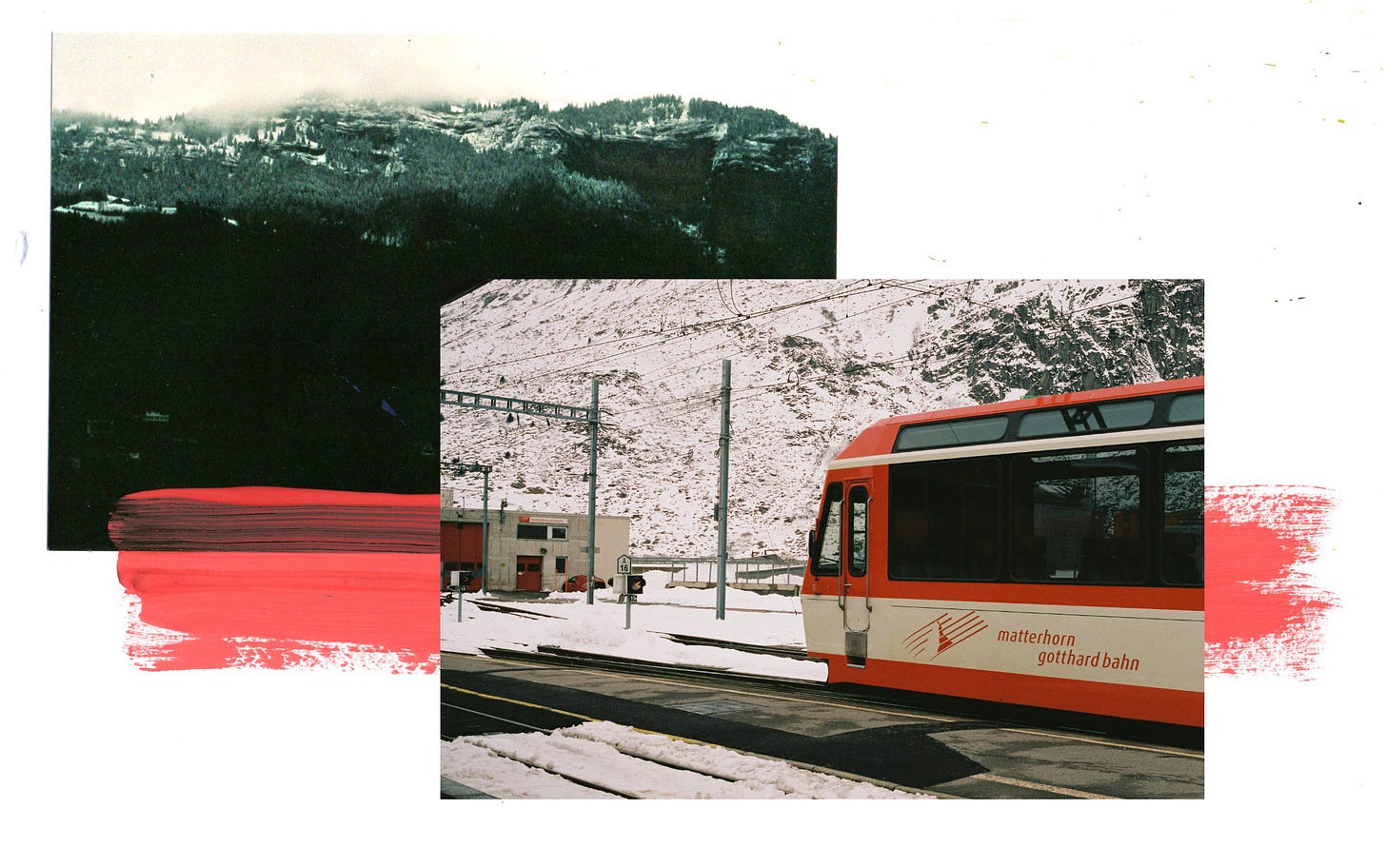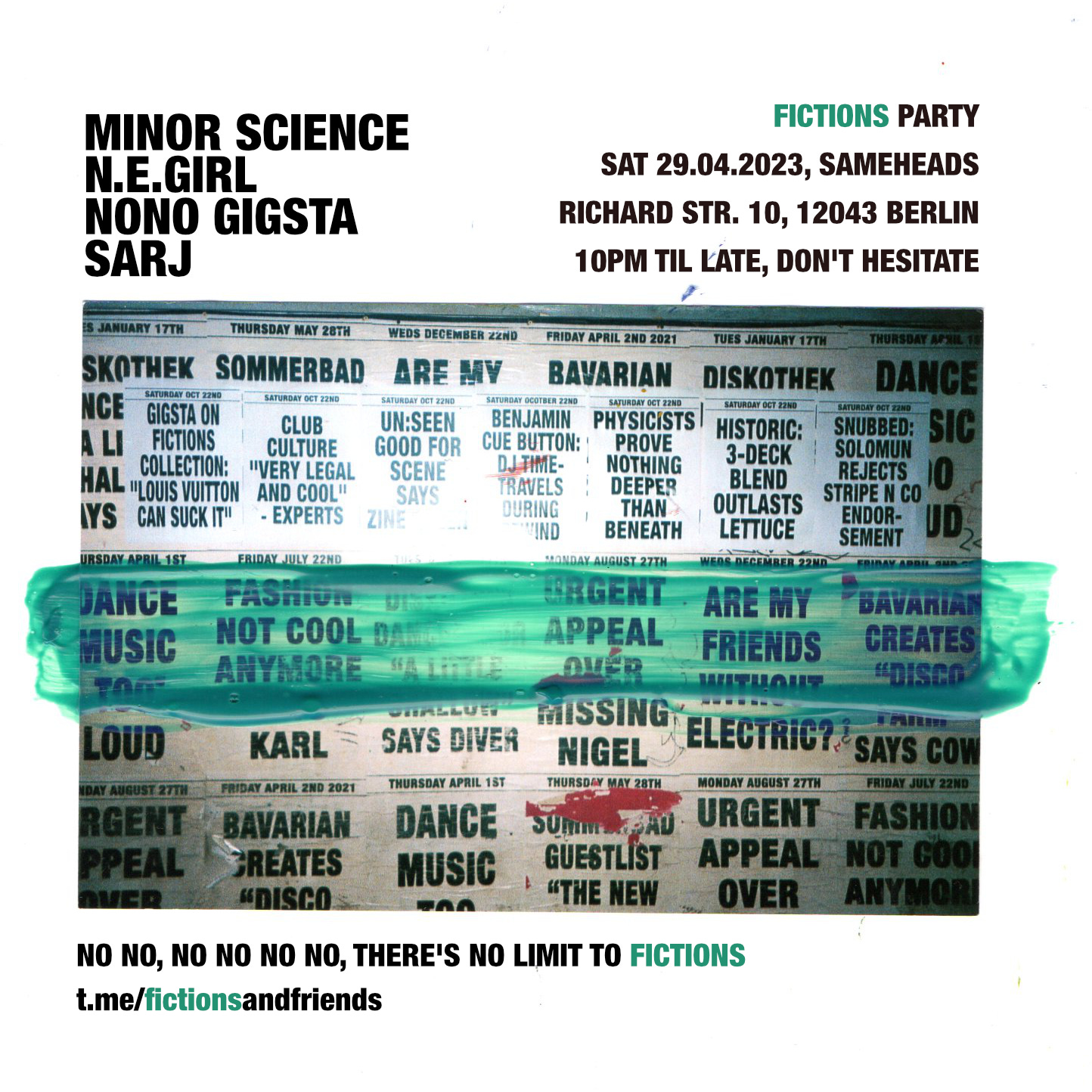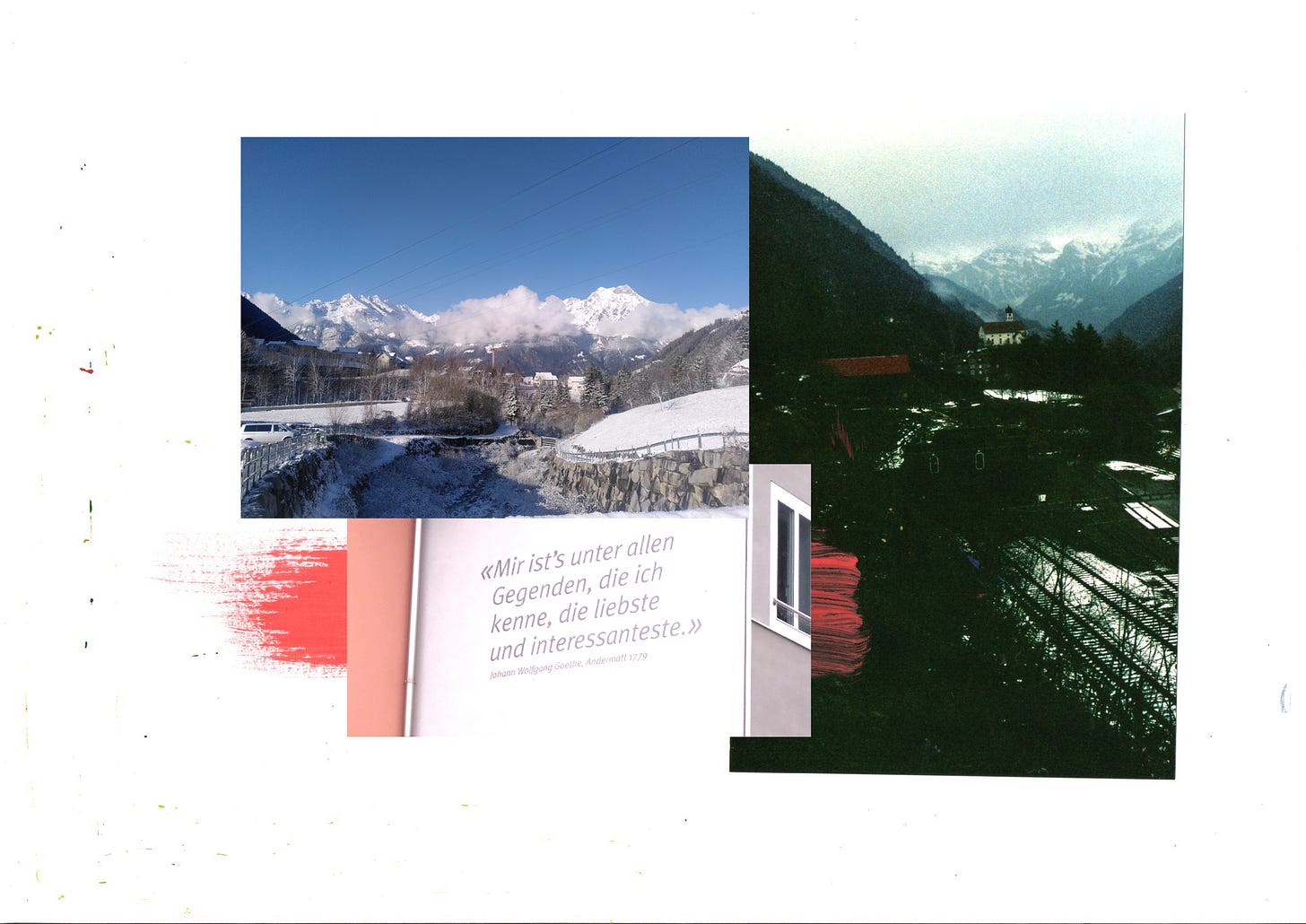Audio version of this newsletter
Hi friends,
Important reminder first: we have a party on Saturday (29.04) WITH N.E.GIRL AND SARJ and you're invited!! More info (and more announcements) at the end of this newsletter :)
But how have you been? Are you enjoying the brighter days?
A friend of mine is currently journeying to the very north of Scandinavia by train and foot, and we joked that we might be the only people who wanted to extend winter. I recently took a magical hike through the Alps and found myself crying and laughing out of euphoria after reaching the tip of a snowy mountain.
I love winter for what it actually offers. But I also love it because I’ve developed a growing anxiety around warmer days and the increasing challenges that they bring. It’s said that El Niño will return in 2023 and some even predict a potential "super El Niño". In short, this describes a phenomenon where the warming of the Pacific Ocean leads to extreme weather events, including - but not limited to - very high temperatures.
During my solo hike, I took a break from most communication. I did, however, eagerly check the result of the Berlin2030 referendum which happened on March 26th. The aim of the campaign was to "obligate the Berlin Senate to reduce climate-damaging emissions in the city in a socially just manner by 95% by 2030". Sadly, not enough people voted to support this idea.
Being met with this news, as I was piercing my way through a rough yet stupendous snowy storm, completely floored me. As with most elections, the factors that shaped its results were quite complex. The fact that only people with German citizenship were allowed to vote, for example, was really unfair. So many Berlin inhabitants don't have German citizenship, yet should be allowed to participate in such a decision. The Berlin2030 campaigners strongly criticised this constitutional rule themselves.
Beyond the particularities of this situation, my solo hike saw me reflecting more broadly on belonging: not only about who is allowed to participate in decision making but also who would want to. It seems like life was up to one of its tricks, peppering my walk with little cues. Halfway through, I bumped into some Gary Snyder words written on a rock: “Find your place on the planet. Dig in, and take responsibility from there.”
This was interesting. Do I feel like I take responsibility for the city I live in? Do we collectively take responsibility? In the various social circles I am connected to, there was very little discussion of this campaign, let alone its results. Yet, this was huge news! It could have made a big difference. Am I part of an extractivist industry by being a "Berlin-based DJ"? As you'll see at the bottom of this email, I have some trips planned and, no, I won't fly to any of these places; but is slowness inherently sustainable? Could mobility itself be the issue? Or is it rather "hyper"-mobility and if so, how do we even measure it?
Speed is relative. As I mentioned in a newsletter some months ago, trains used to be associated with speed. Now they are seen as "slow". Yet, with the proliferation of bullet trains, there are debates about some rail transport’s environmental impacts; we know that the cleanliness of a train depends not only on its speed, but crucially how and where its energy is being sourced. I do wonder, at times, if the environmental impact of all the train journeys I take over a year would equal another person's return flight in the same period. But are energy and impact merely an equation? And shouldn't we, in the words of my friend Ollie Zhang, scale down the "metric mindset"?
These complexities were mirrored in the very landscape I was walking through. I wasn't fully aware of this when I, very spontaneously, booked my night trains from Berlin to Basel, but the Via Gottardo actually follows the historic trade route that has connected Germany and Italy since the 13th century. The hike starts in the North of Switzerland and traverses a range of mountains heading towards the South. It takes around 20 days to walk it but I only did a smaller section.
On the path, the history of the route is documented in various ways, underlining a succession of human interventions on the landscape to accelerate the journey. The construction of the Gotthard railway, for example, started in 1872 and the full train line opened 10 years later. At the beginning of the 19th century, it took travelers 10 days to traverse it on horse, and via some paved roads. The railway cut it to a mere 8 hours, and with improved train efficiency it now takes around 3. In parallel to the railway, there are now also multiple car roads, including a busy motorway that echoes through the mountains at any given second.
From this perspective, it's easy to see mobility along a linear axis: something that accelerates over time with the help of new technologies. The French engineer Laurent Castaignède recently released a book entitled La Bougeotte, Nouveau mal du siècle?, which translates to something a bit like: Fidgeting: The New Disease of the Century. In the section "Outflow of Resources”, Castaignède writes: "In the 18th century, great land and sea routes were already linking the major regions and cities, mainly within the Western world, but also towards its conquests. [...] In the 19th century, rail networks were added, constituting more or less dense connections, especially throughout the industrialising world."
Inevitably, Castaignède is very critical of the unfair and destructive growth of certain transport industries, not least aviation. He isn't totally against spatial mobility - he argues that we need to "restore the value of traveling" - and, obviously, I agree with most of his analysis. Yet, the chronological determinism deployed in these kinds of narratives feels, at times, somewhat narrow.
In The Dawn Of Everything, A New History of Humanity, David Graeber and David Wengrow write: "We are used to assuming that advances in technology are continually making the world a smaller place. In a purely physical sense, of course, this is true: the domestication of the horse, and gradual improvements in seafaring, to take just two examples, certainly made it much easier for people to move around. But at the same time, increases in the sheer number of human beings seem to have pulled in the opposite direction ensuring that, for much of human history, ever-diminishing proportions of people actually traveled - at least, over long distances or very far from home. If we survey what happened over time, the scale on which social relations operate doesn't get bigger and bigger; it actually gets smaller and smaller."
I haven't finished their book yet, but so far the Davids have had me stopping in pure wonder on every other page, lifting my eyes while letting out an audible "oh!" Here's another paragraph for your reading pleasure: "Of course, we know almost nothing about the languages people were speaking in the Upper Palaeolithic, their myths, initiation rituals, or conceptions of the soul; but we do know that, from the Swiss Alps to Outer Mongolia, they were often using remarkably similar tools, playing remarkably similar musical instruments, carving similar female figurines, wearing similar ornaments or conducting similar funeral rites. What's more, there is reason to believe that at certain points in their lives, individual men and women often traveled very long distances. Surprisingly, current studies of hunter-gatherers suggest that this is almost exactly what one should expect."
At risk of repeating myself, what is so depressing about the long-haul-flight-for-a-handful-of-gigs model is not only how incompatible it is with a liveable planet, but how incompatible it is with a fair planet. It is disappointing, because it gives us the illusion that "more" of us travel. It is disturbing, because it pretends that it is connecting us, when in fact, "the scale on which social relations operate" may be getting "smaller and smaller"!
In La Beougeotte, Castaignède gives a few recommendations for those of us who are motivated to "participate in the necessary (and inevitable) change of paradigm", including "escaping, as much as possible, the direct and indirect advertising messages". I get his point and I find myself avoiding the corners of social media where atmospheric colonisation is being normalised and celebrated. In parallel, I find the deepest hope in loved ones’ creative approach to the transition. One of my best friends recently underwent chest surgery financed by her community. She was accompanied by her mum, who has a working class-background, and together they took trains all the way from rural UK to Lithuania where the operation happened. My friends and I share these kinds of stories in a Telegram chat that I could add you to, if you reply to this letter with your contact.
I'm also interested in collective narratives, though I wonder if they may, at times, erase the particularities of certain situations. In 2019, the French cabinet BL Evolution wrote that in order to adhere to the 1.5°c limit, we should limit ourselves to "two return long-haul flights in a whole life". Or preferably, they added, "none at all". As I have studied the social and environmental impacts of the aviation industry, I understand these metrics and also happen to have enough privilege to act upon them. Yet these “individual” recommendations addressed to “everyone” sometimes feel weirdly arbitrary, especially here, given France's colonial history.
Maybe, by sticking to numbers, we're failing to imagine desirable and abundant futures. I keep thinking of Ollie Zhang’s words, when they insist that they are not making an “essentialist argument that frames capital as totalising and inescapable.” Rather, they are acknowledging “the scalability of capitalism, but also the abundance of nonscalable projects taking place in its peripheries. [...] For those who inherited Western modes of knowing and a ‘detached’ viewpoint, [Zhang’s work] advocates for seeing and knowing beyond the big – not just moving past it, but zooming both out and in, noting activity in its underbellies, reliefs, and cracks.”
In the past weeks, I've been wondering what kinds of spatial mobility we could imagine that feel just, inclusive and celebratory. Are there any myths, past or future, that could support the walk towards a fairer world? For the next Fictions, I'll explore sounds and music related to protests, processions and groups of people all moving in the same direction. Like finding our places on the planet, and traveling from there, together? Dates for this and more are below!
Happy spring, friends!
xx
Nono
PS: a huuuuge thanks to Ollie and Angus for helping me out with this edition of the newsletter <3
PPS: Angus’ last record as MS is finally out!!
Rendez-vous
27.04: FICTIONS RADIO SHOW on Cashmere. Naga is hosting his show at 6pm and I’ll host mine at 7.30pm. Address: Koloniestr. 29 - 13359 Berlin. There is a bar and you can bring snacks!
29.04: FICTIONS PARTY in Sameheads. We have two wonderful guests, an awareness team and a new ziiiiiiine! Last Fictions dance for a lil a while. B2B2B2B all night long, 10pm til late, don’t hesitate :)
01.05: POWER PLAY in Berlin. I’m playing outside from 18:00 til 20:00 at this Mayday charity rave. RSVP mandatory.
20.05-15.07: RESIDENCY in Morocco. I’ve been invited by Nawat Fes to work on music, writing, host workshops on aviation and climate justice, DJ workshops and play some music myself. Let me know if you have thoughts or tips? I’ll be travelling through Spain on the way back.
05.08: TORNOAD RIDDIM microfestival near St Brieuc (France)
09.09: CHANTELOUVE microfestival near Grenoble (France) As I mentioned in a former newsletter, this was a highlight last year!
16.09: TBA, Italy
Broadcast
FICTIONS #57: First hour is from the beginning of our day party in march and the last minutes are from the very end. On popular demand, this show features the surprise Dr Nono Limit track which Anne, Karim & Job made for the occasion.
WHOLE TALKS: How can we collectively shift our desires away from “partying as usual” towards slower, less fossil consumptive forms of raving and live up to the eco-social justice values our community is committed to? Thanks Domi & Jonas from Stay Grounded and Niklas from Berlin2030 for speaking out on the panel I hosted at Whole festival last year!
FICTIONS #56: Some thoughts on music and the ineffable and tracks related to my academic research.
About
PAST: If you’re new here, here’s the archive of former editions, which are mostly musings about club culture and sustainability. But not only. I wrote something about destination festivals last year, for example. Environmental activists are still protesting against the construction of the Vlora airport in Albania.
FUTURE: I started working on a newsletter edition exploring the environmental impact of our digital lives and how that’s relevant to our culture and communities. Any recommendations of things to read or listen to? I’d also love to know your recent thoughts on the shifting social media landscapes. I reluctantly re-activated my Instagram account, partly because the other Gigsta’s are taking more space over there. But I just don’t know if I have it in me… Help, where shall we coordinate?




